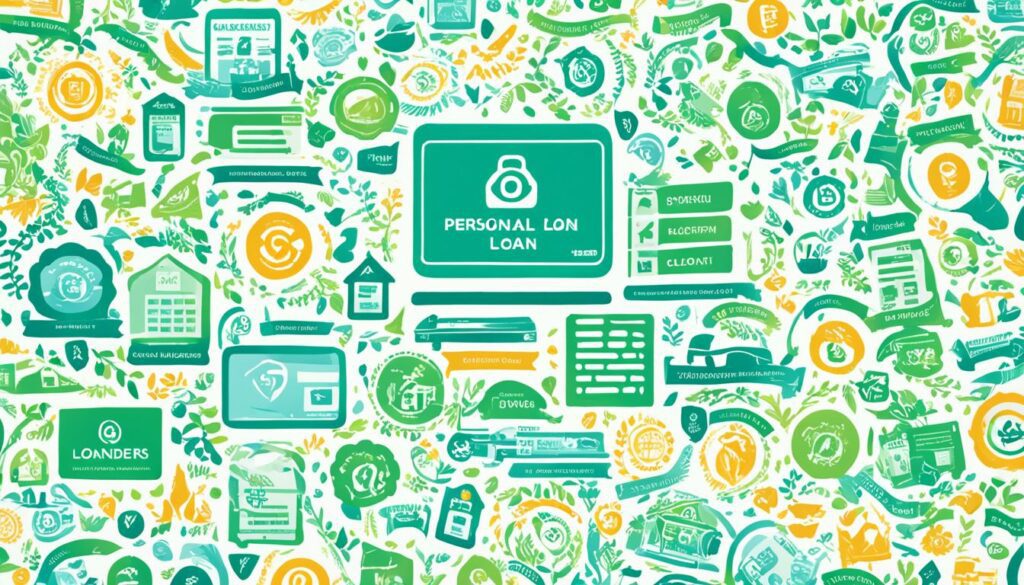Applying for a personal loan can help you finance a variety of needs. This includes things like merging debts, house upgrades, or handling sudden costs. The journey can look tough, but we’ll help you take it step by step. We aim to equip you with all you need to know to make the right decision.
Key Takeaways
- Determine your borrowing needs and financial situation to identify the right loan amount and terms.
- Review your credit score and history to understand your eligibility for personal loan products.
- Research and compare lenders to find the best interest rates, fees, and repayment options that align with your preferences.
- Gather the required documentation, such as income statements, employment details, and identification, to streamline the application process.
- Follow the lender’s specific application guidelines and submit a complete and accurate loan request to increase your chances of approval.
Determine Your Loan Requirements
Start by figuring out how much you need and why. You should know the personal loan amount and your reason for needing the loan. Your credit score is also essential. It affects the interest rate and terms you might get.
Assess Your Financial Needs
Look at your money situation and why you need the loan. Maybe you want to combine debts, buy something big, or handle a surprise cost. Knowing the personal loan purpose will guide you to the right personal loan amount.
Think about your budget, debts, and future bills. By doing this, you can pick a loan that works for you. It will help you reach your financial goals.
Consider Your Credit Score
Your credit score matters a lot when applying for a loan. It decides the interest rate and the terms. Lenders check it to see if you’re a reliable borrower.
A low credit score might mean you pay a higher rate. But if your credit score is good, you could get a better deal. This includes lower interest rates and more money available as a loan.
Knowing your personal loan eligibility helps you make a smart choice. You’ll pick the best loan for your situation and needs.
“Knowing your financial needs and credit standing upfront is the key to finding the right personal loan for your situation.”
Research and Compare Lenders
After figuring out what you need in a personal loan, it’s key to look at different lenders. You should check things like how much interest they charge, any fees, and how long you have to pay back the loan. This helps you choose the best loan to match your money situation.
Evaluate Interest Rates and Fees
It’s crucial to look at the interest rates and fees when you’re looking at different lenders. You want to find lenders with good interest rates, right for your budget and credit score. Also, watch out for any extra fees like those for starting the loan, paying late, or paying early. These can really change how much your loan ends up costing.
| Lender | Interest Rates | Fees | Repayment Terms |
|---|---|---|---|
| Lender A | 6.99% – 24.99% | $0 – $149 origination fee | 24 – 84 months |
| Lender B | 8.99% – 35.99% | $0 – $299 origination fee | 12 – 60 months |
| Lender C | 5.99% – 19.99% | $0 – $99 origination fee | 36 – 72 months |
This table shows what interest rates and fees three lenders have. It lets you compare what they’re offering. Remember, the rates and terms you see here might change depending on your own credit score and other details.

“Comparing multiple personal loan lenders is the best way to ensure you get the most favorable terms for your financial situation.”
When you spend time checking out and comparing lenders, you can pick a loan that’s right for you. This will help you get a loan that fits your budget and needs.
How To Apply for a Personal Loan in 5 Steps
Getting a personal loan is easy if you prepare well. First, get your financial info together. Know your income, debts, and credit score. This will help you plan out how much you can borrow and what terms are good for you.
After that, look at different lenders. Find the ones with the best rates and fees. Many let you apply online, which is super simple. When applying, make sure you’ve all the documents they need. This includes ID, job details, and how much you make.
Then, it’s the lender’s turn to look over your info and decide. If they say yes, you’ll sign the loan paperwork and may need to share more details. After everything checks out, the loan money goes straight to where you want it. You can then pay off debt, fix up your home, or any personal need.
FAQ
What is the personal loan application process?
A personal loan is easy to apply for. First, figure out what you need. Then, look at different lenders. Next, fill out an application. After that, you’ll need to show some documents. Finally, you wait to hear back from the lender.
What documents are needed to apply for a personal loan?
If you’re applying for a personal loan, you’ll need some basic documents. This includes a form of ID, like a driver’s license. You’ll also need to show where your money comes from. This can be pay stubs, tax returns, or bank statements. Lastly, they’d like to know how much you owe and if you own anything.
How does my credit score impact my personal loan?
Your credit score is pretty important when getting a personal loan. The better your score, the better your loan terms. But remember, each lender has their own rules on what score they’ll accept.
What should I consider when comparing personal loan offers?
Key things to think about when looking at loan options are the interest rate and any fees. You also want to check out the repayments and what extra stuff the lender includes.
How can I increase my chances of personal loan approval?
To have a better shot at getting a loan, here’s what you do. Figure out what you need and if you can get a loan first. Look at a few different lenders. Make sure you have all your paperwork. Then, fill out the form completely and truthfully.







